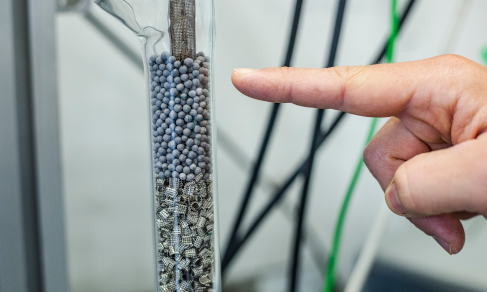Utilization options for hydrogen import (LNG2Hydrogen)

In order to secure the energy supply in Germany, natural gas is currently acting as a transitional technology. Against this backdrop, the first LNG terminals have also been built in Germany, which the German government plans to use as logistical hubs for green hydrogen and its vectors in the future.
The main objective of LNG2Hydrogen is to develop a solid data basis and recommendations for the future utilisation of LNG terminal locations as logistical hubs for hydrogen and its derivatives (H2 transport vectors). Synthetic Natural Gas (SNG), Liquid Hydrogen (LH2), Methanol (MeOH), Ammonia (NH3), Liquid Organic Hydrogen Carrier (LOHC) and Dimethyl Ether (DME) are considered as alternative vectors. By creating a bridge between existing LNG infrastructure and future hydrogen applications, the project contributes to the efficient and sustainable utilisation of these resources.
The project involves 18 partners from science and industry, including terminal operators.
HI ERN contributes its extensive expertise from research and development into LOHC-based hydrogen storage systems. Energy integration concepts are developed and process engineering design principles, e.g. for autothermal dehydrogenation for an LOHC-based terminal, are contributed. Furthermore, project partners are supported in the investigation of material compatibility.
The LNG2Hydrogen joint project is an important building block for achieving the goals of the overarching TransHyDE flagship project and makes an important contribution to the implementation of the national hydrogen strategy.
What is LOHC?
LOHC stands for "Liquid Organic Hydrogen Carrier", a liquid organic hydrogen carrier. An LOHC is an oil-like liquid that can be charged with hydrogen and discharged again. The hydrogen released during discharge can then be converted into electricity using a fuel cell. With this organic carrier liquid, it is possible to retain the existing infrastructure of diesel tank containers as far as possible. The storage and delivery of larger quantities of fuel would also be possible without restriction using LOHC technology, regardless of the safety aspects that need to be taken into account with elemental hydrogen.
Project background
LNG2Hydrogen is one of several sub-projects of TransHyDE, one of three hydrogen flagship projects of the BMBF, with the aim of removing the obstacles to a hydrogen economy that still exist. Only a suitable transport infrastructure can guarantee a successful hydrogen economy. Import, local distribution and storage require different approaches. TransHyDE is further developing and testing technologies for the transport and storage of hydrogen. The final aim is to find the right technology for each application. The findings of all TransHyDE projects will result in recommendations for action for the national hydrogen infrastructure.
More information
The three hydrogen flagship projects represent an important contribution by the Federal Ministry of Education and Research (BMBF) to establishing the National Hydrogen Strategy. On this page, you will find all relevant information concerning the planned projects and green hydrogen. Read more
Project partners
The network is made up of 18 strong partners from research and industry. It is coordinated by cruh21 GmbH.
Project period
06/2023 until 11/2024
Funding
This project is being funded by the Federal Ministry of Education and Research (BMBF) with approx. €3.8 million.
Contact
Prof. Dr. Peter Wasserscheid
Director and Head of Research Department Chemical Hydrogen Storage
Room T3.94






